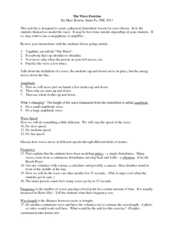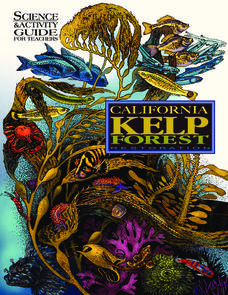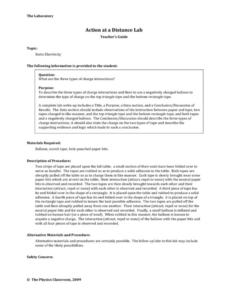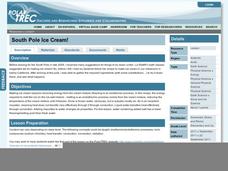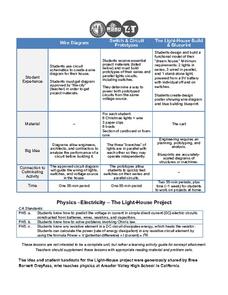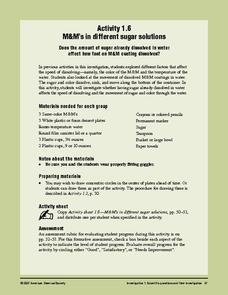The Science Spot
The Wave Exercise
During a instructional activity on wave motion, physical science participants basically act out the waves as a group. Through their movements, the amplitude, speed, frequency, and wavelength are all identified. Ideas for modeling the...
Dawn N . Ericson
California Kelp Forest Restoration
This unit is so cool, you won't be able to "kelp" yourself! Intended for all grades, this science and activity guide for teachers offers a unique opportunity to understand kelp's role as a valuable ecological resource. Teachers and...
Wild Screen
Design a Conservation Programme
In a comprehensive project, teen ecologists read case studies to learn about successful conservation programs, then work together to research an ecosystem. The project culminates with either an in-class presentation about a conservation...
Hawaiʻi State Department of Education
Cloud Sculpting
Dance is a fantastic way to communicate thoughts, feelings, and even science concepts. Make this activity a part of your next unit on weather and clouds. Kids will discuss types of clouds, how they look, and what they do. Then, they will...
Nuffield Foundation
Dissection of the Ventilation System of a Locust
Jiminy cricket! If you find yourself plagued by fear of dissection, these locust respiratory system dissection directions will walk you through everything you need to know. Teens inspect a living locust to begin with, then jump over to...
Berkeley Engineering and Mentors
Marshmallow Catapaults
After a brief lecture on levers, torque, projectiles, and the five-step engineering design cycle, young physical science learners or engineers build catapults out of craft sticks. This is an open-ended exploration of what works and what...
Physics Classroom
Action at a Distance Lab
The concepts involved with static electricity are typically taught in upper elementary physical science units. The lab described in this resource has pupils examine the behavior of small pieces of paper and a balloon when a charged piece...
California Academy of Science
Snakes and Lizards Length and Movement
Snakes and lizards can be very tiny or very long. Your class will get out their rulers to see just how big snakes and lizards can be. They discuss several different reptiles by reading the included animal fact cards, then each small...
Polar Trec
South Pole Ice Cream!
How can you turn an ice cream activity into a scientific investigation? It's easy if you know ionic compounds, heat transfer, and the exothermic and endothermic process. Learners will explore the science behind freezing, insulation, and...
Institute of Electrical and Electronics Engineers
Wind Tunnel Testing
One of the factors that automotive engineers must consider is wind drag. The less wind drag, the more efficient the car will be. They perform many tests in wind tunnels, then refine their designs and test again. Using simple materials,...
Curated OER
Turtle and Tortoise Preschool Lesson Plan
One of the best parts about teaching the littlest learners is that you can create thematic lessons that use one topic to address every subject. Here is a nice set of thematic teaching ideas that uses turtles and tortoises to teach...
Earth Day Network
Conserving Water Through Art!
Having fresh, clean drinking water is a privilege many people take for granted. Help raise awareness about the scarcity of water and the importance of conservation by discussing different ways water is used in everyday life. Brainstorm...
Curated OER
Roller Coasters
Twisting and turning through the sky, roller coasters are popular attractions at amusement parks around the world, but how exactly do they work? Explore the physics behind these thrilling rides with an engineering design activity....
Berkshire Museum
The Three Life-Giving Sisters: Plant Cultivation and Mohican Innovation
Children gain first-hand experience with Native American agriculture while investigating the life cycle of plants with this engaging experiment. Focusing on what the natives called the Three Sisters - corn, beans, and squash - young...
Berkshire Museum
Backyard Rocks
You don't have to travel far to learn about rocks, just step outside, pick up a stone, and begin investigating. After taking a class walk around the school grounds collecting rocks, young scientists practice their skills of observation...
Trash For Teaching
The Light-House Project
Groups work together to design a lighthouse, from designing and drawing the wiring diagram, to creating prototypes of the switch and circuit, to envisioning and building a scale model along with a blueprint. By including different...
American Chemical Society
M&M's in Different Sugar Solutions
To conclude a mini unit on the dissolving of M&Ms® candy coating, this lesson investigates whether or not the concentration of sugar in the solvent affects the dissolving rate. Consider having older science learners write their own...
American Chemical Society
Neutralizing Acids and Bases
Now that your science class has experimented with pH indicator and identified acids and bases, they attempt to get the cabbage juice indicator back to its original color. This is done through neutralization of the acids and bases that...
Ocean and Coastal Interdisciplinary Science
The Dark Ocean
Is the ocean blue at all depths? Nope! Explore the science behind the light spectrum in deep, dark waters. The lesson recommends watching The Blue Planet: Open Ocean—The Deep, but it's not integral, or you can substitute another clip....
ARKive
Adaptations to Arid Habitats
How do plants and animals survive in habitats with very little water? Explore arid ecosystems and the way their inhabitants have adapted with a lesson and science experiment. After kids listen to a presentation about adaptation, they...
NOAA
The Cycle of Water
Help young scientists get to the bottom of the water cycle with this comprehensive earth science lesson. After first viewing and discussing presentations about the states of water and the water cycle, the class performs a series of...
NOAA
A Watery World
With about 70% of the earth's surface covered in oceans, it's fair to say that we live in a very wet world. Young scientists gain a better appreciation of this fact as they use maps to identify the world's ocean basins in the first...
ARKive
Adaptations for Movement
What animals are best suited for moving around a rainforest, or a desert? Design your own animal species based on a particular habitat, focusing on the characteristics it will need for optimal movement. Great as a group lesson or...
National Geographic
Types of Volcanic Eruptions
Blow the roof off your classroom with this multimedia science lesson on volcanic eruptions. A short online video teaches young geologists about shield and composite volcanoes and explores the examples of Kilauea and Mt. Vesuvius, before...
Other popular searches
- Earth Science
- Physical Science
- Life Science
- Science Project
- Science Space
- Environment Science
- History of Science
- Environmental Science
- Pe Science
- Family and Consumer Science
- Consumer Science
- Social Science


